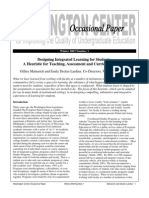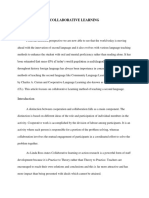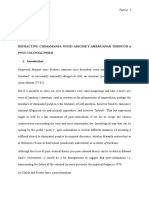Team Teaching: Bene Ts and Challenges: Speaking of
Uploaded by
srirammaliTeam Teaching: Bene Ts and Challenges: Speaking of
Uploaded by
srirammaliTeaching
Fall 2006
NEWSLETTER
Vol.16, No.1
Speaking of
T H E C E N T E R F O R T E A C H I N G A N D L E A R N I N G S TA N F O R D U N I V E R S I T Y
Team Teaching: Bene ts and Challenges
n recent years, team-taught courses
have become an important part
of the Stanford curriculum. Long an
integral aspect of the Introduction
to the Humanities (IHUM) program,
team teaching has now found a place
in many different departments, pro-
tive approach.
Professors Lanier Anderson (Philosophy) and Joshua Landy (French
and Italian), who have team-taught
several courses together, summed up
some of the lessons taken from their
experience in an Award-Winning
Teachers on Teaching presentation
during Winter Quarter 2005-2006. In
the following, their suggestions for
team-teaching, presented as a mock
Decalogue, are interspersed with results
from recent research on team teaching.
effort will result in a far more successful intellectual experience. As Cowan,
Ewell, and McConnell (1995), a teaching team at City College of Loyola
University in New Orleans, write, Our
joint planning sessions became interdisciplinary conversations into which
we subsequently invited our students.
These conversations were among the
highlights of our teaching together
(par. 5).
Thou shalt attend thy neighbors lectures.
Thou shalt plan everything with thy
neighbor.
Professor Lanier Anderson
grams, and disciplines, at levels ranging
from undergraduate lectures to graduate
seminars. Team teaching boasts many
pedagogical and intellectual advantages: it can help create a dynamic and
interactive learning environment, provide instructors with a useful way
of modeling thinking within or across
disciplines, and also inspire new
research ideas and intellectual partnerships among faculty. To experience the
full benefits of team teaching, however,
instructors must adjust their course
planning and classroom management
strategies to accommodate a collabora-
Team teaching requires different preparation than traditional, single-instructor courses, particularly concerning
the organizational aspects of course
management. Careful and extensive
planning can help instructors prevent
disagreements down the line regarding
assignments, grading procedures, and
teaching strategies (Letterman and
Dugan, 2004; Wentworth and Davis,
2002). Planning meetings also allow
instructors to familiarize themselves
with their partners material, helping
make the class a true team effort from
the start. According to Landy, Everyone on the team has to be behind every
element of the course. While reaching
this consensus may take a lot of time
and compromise, in the end the extra
One of the most important rules of team
teaching, Landy says, is to attend all
meetings of the class. Never miss a
colleagues lecture. Anderson and
Landy use what is typically called
Professor Joshua Landy
an interactive teaching model, where
all members of the teaching team are
present during each course meeting.
This model provides the most oppor-
Fall 2006
Vol. 16, No.1
tunity for the integration of different
subjects and disciplines. However, when
scheduling or budget constraints make
this level of interaction unfeasible, there
are different formats that can give students and instructors the experience of
a team-taught course. For instance, in a
rotational model, only one instructor
is present at a time, but a series of
instructors rotate throughout the course,
teaching only the course topics that
fall within their specialty. While the
rotational model allows students to learn
each aspect of the course material
from an expert in the field, it has the
disadvantage of forcing students to
adjust to a new teachers style several
times over the course of a quarter
(Morlock, 1988). In a dispersed team
model, the course meets two or three
times a week, once with all faculty
members present, and once or twice
more in sections with one faculty
member present. This model provides
opportunities for integration and interaction when the instructors teach
together, but also provides a small class
environment in a single-instructor scenario (McDaniels and Colarulli, 1997,
p. 32). However, this model can limit
the opportunity for students to hear multiple perspectives on the same topic, one
of the core learning advantages of team
teaching.
Thou shalt refer to thy neighbors
ideas.
The purpose of a team-taught course,
from an educational standpoint, is to
push students to achieve higher levels of
synthesis and integration in their study
of new material. It is, therefore, vitally
important for instructors to model
the process of integration by interweaving teaching partners perspectives into
each presentation. Often students are
assigned projects that require them to
integrate the material individual instructors have presented. Consequently, students have expressed a desire for
teachers to demonstrate the same practice of integration in their own lectures
2
Speaking of Teaching
and presentations (Minnis and JohnSteiner, 2005). Anderson and Landy
integrate their different disciplinary
approaches by referring to each other
in lectures and presentations. By showing respect for each others ideas, even
when they may disagree, they are able
other courses and assignments. If youre
trying to prepare students for interdisciplinary work themselves, then you really
need to pay attention to modeling for the
students what the disciplinary approaches are, Anderson says.
Have somebody sitting in the middle, Landy
suggests. It really encourages a kind of crossfire, and the sense that people are all equal
participants in the process.
to keep students interested and engaged
in all aspects of the course material.
Some teaching teams take a more
direct approach, and assign one instructor during each class meeting the task
of making connections among different
course topics (Corcos, Durchslag, Morriss et al., 1997). Whichever method
instructors choose, giving students the
opportunity to observe integration in
action helps them better understand
instructors expectations, as well as
improve their own learning outcomes.
Thou shalt model debate with thy
neighbor.
Team-teaching allows students to
observe high-level intellectual debate
among colleagues. Anderson and Speck
describe this respectful debate as professional disagreement that is both
expert and collegial (1998, p. 681).
When such debates are successful, students learn to disagree without hostility.
They also learn how to encounter new
material through a variety of perspectives, and gain a practical knowledge of
different academic disciplines. Watching
instructors debate using different methodological approaches allows students
to discover the advantages of different
disciplines, and to understand which
methodology best suits a particular line
of inquiry. In addition, interdisciplinary
debate encourages students to apply the
skills of integration and collaboration to
Thou shalt have something to say, even
when thou art not in charge.
Although Anderson and Landy urge each
member of the teaching team to be present during each course meeting, often
only one instructor has the primary
responsibility for presenting material on
a certain day. What to do when youre
not the one in charge? The instructor
who is not presenting still has an opportunity to help students better understand
the material by acting as an exemplary
student (Hammer and Giordano,
2001). In Anderson and Landys courses,
the instructor who is not leading the
class meeting often plays the role of a
kibitzer, sitting in the middle of the
class and offering commentary on the
others presentation or lecture. Have
somebody sitting in the middle, Landy
suggests. It really encourages a kind
of crossfire, and the sense that people
are all equal participants in the process.
Wentworth and Davis offer several suggestions for different roles the nonpresenting teacher can play. Among
them are: model learner, in which the
instructor asks questions and otherwise
contributes to discussion; observer, in
which the instructor takes notes and
gauges student response to the presentation; discussion leader, in which the
instructor facilitates or leads break-out
groups; or devils advocate, in which
the instructor raises provocative or challenging questions in an effort to stim-
Fall 2006
Vol. 16, No.1
ulate class creativity (Wentworth and
Davis, 2002, p. 27).
Thou shalt apply common grading
standards.
One of the benefits that team teaching
offers students is an increase in the
amount of feedback they receive from
instructors (Wadkins, Miller, and Wozniak, 2006). Yet, students often worry
whether instructors will apply consistent
grading standards. Conflicts can emerge
regarding the standards for evaluating
student work, and instructors sometimes
struggle to bridge their differences
regarding evaluation procedures or
criteria. Landy recommends, Youd
better find some way of having mutually
agreed-upon standards. Its best to be as
explicit as you can about how you want
to grade. To ensure fairness in grading,
some instructors design a specific
grading rubric, tailored to the needs of
a team-taught course. For instance, one
teaching partnership devised the following system: Papers that clearly met our
expectations were read, responded to,
and evaluated by just one teacher; others
that the first reader deemed as not meeting expectations or marginal were read
by both teachers. Together, we would
make suggestions and assign a point
value for that section of the paper
(George and Davis-Wiley, 2000, p. 77).
Like most aspects of team teaching, the
extra time and attention devoted to grading strengthens instructors pedagogical
practices, in this case by encouraging
them to better understand the philosophy
behind their grading procedures. For
example, collaborative grading allowed
Anderson to understand much more
explicitly what the grading standards are
that I think are important and why.
Thou shalt attend all staff meetings.
In addition to increased preparation time,
successful team teaching also requires
ongoing meetings among instructors to
review and reassess their goals for
the course. For many team teachers,
meetings become the testing ground for
Speaking of Teaching
the sort of dialogic instruction they present in class. Meetings allow instructors
time to plan upcoming courses, but also
to reflect upon their progress thus far,
and to compare their impressions regarding student response and engagement
(George and Davis-Wiley, 2000). Anderson and Landy use meetings to test
the pulse of the course. It is important
to have regular class meetings, Landy
urges, because in a team-teaching environment, you have everyone pulling in
different directions, and you need to
keep a coherence in the course.
Thou shalt ask open questions.
Students in team-taught courses learn
new material by approaching it from
many different perspectives. The dialogic
structure of class meetings often stands
in stark contrast to the lecture format to
which many students and instructors are
accustomed. Instructors must, therefore,
adjust their teaching practices to invite
many different responses to a particular
question or issue. As Landy suggests,
asking a question that is susceptible to
multiple answers is very powerful, and
also extremely hard to do. Yet he advises
instructors to try to ask some questions
to which you really have no idea of
the answer. Doing so is a risk, but, as
Anderson notes, it takes students out
figure out the key points of a lesson
when faculty choose to present many
possible solutions to a problem (McDaniels and Colarulli, 1997). In some cases,
faculty must work hard to overcome
students resistance to the non-lecture
format; a good first step is to be clear
about the format of the course right
from the start (Helms, Alvis, and Willis,
2005).
Thou shalt let thy students speak.
Team teaching can have a highly positive
impact on student learning outcomes,
largely due to the increased opportunity
for student participation that team teaching provides. The presence of more than
one instructor in the classroom increases
the occasions for student-teacher interaction (Wadkins, Miller, and Wozniak,
2006). More importantly, a collaborative
teaching environment invites students to
take a more active role in the learning
process. Because team teaching encourages a variety of perspectives on a topic,
students are more likely to feel they can
make valuable contributions to class discussions (Anderson and Speck, 1998).
Its good, in the first few meetings, to
set up a pattern in which people do intervene in the discussion from all kinds of
angles, Anderson notes. He and Landy
make a conscious effort from the begin-
...ask some questions to which you really have
no idea of the answer. Doing so is a risk, but,
as Anderson notes, it takes students out to the
leading edge of knowledge and shows them
what the production of knowledge is really like.
to the leading edge of knowledge and
shows them what the production of
knowledge is really like. Likewise, to
gain the benefits of this mode of inquiry,
students must stop searching for the one
right answer to problems. Although
many students enjoy the diversity of
voices and viewpoints that emerge in the
team-taught classroom, others struggle to
ning of the quarter to create a learning
environment in which student contributions are going to be valued and indeed
expected.
Thou shalt be willing to be surprised.
Part of the challenge of team teaching is
putting yourself in a position where your
own authority and expertise on a certain
3
Fall 2006
Vol. 16, No.1
topic may have to take a backseat.
Faculty must make the shift from being
experts to being expert learners, for
in the collaborative classroom, teachers
and students join in a shared process of
intellectual discovery (Wentworth and
Davis 2002, p. 23). Instructors generally agree that being prompted to look
at a topic from a different angle can
be one of the most rewarding experiences of participating in a teaching
team. Teachers can get out of their
own conceptual boxes and learn new
approaches that will enhance their
own research and writing (Corcos,
Durchslag, and Morriss, 1995, p. 235).
Anderson and Landy, for instance, have
co-authored a paper that was inspired
by the topics covered in the courses
they have taught together. In addition
to creating new research opportunities,
team teaching can also encourage
instructors to hone their pedagogical
skills. Anderson remarks, team teaching does raise your game, and sometimes quite dramatically so.
As Landy says, team teaching gives
professors the opportunity to teach
in a different way, and to learn in a
different way. It allows instructors
to hone their pedagogical skills and
develop new topics for research and
scholarship. The benefits of team
teaching extend to students as well,
improving learning outcomes by
offering increased student-teacher
interaction, as well as a multi-dimenVHS and DVD copies of Professors
Andersons and Landys presentation are
available at the CTL library and online at
http://ctl.stanford.edu/AWT.
The Center for Teaching and Learning
Fourth Floor, Sweet Hall
Stanford University
Stanford, CA 94305-3087
http://ctl.stanford.edu
Speaking of Teaching
sional approach to subject matter.
Ultimately, the advantages of team
teaching far outweigh the time and
energy it requires. Anderson and Landy
describe themselves as recidivists,
returning time and again to the challenges, and the rewards, of team teaching.
Melissa C. Leavitt, Ph.D.
Bibliography
Anderson, Rebecca S. and Bruce W. Speck. Oh What a Difference a Team Makes: Why Team
Teaching Makes a Difference. Teaching and Teacher Education 14, no. 7 (1998): 671-86.
Corcos, Christine A., Melvyn R. Durchslag, and Andrew P. Morriss, et. al. Teaching a Megacourse: Adventures in Environmental Policy, Team Teaching, and Group Grading. Journal of
Legal Education 47, no. 2 (1997): 224-39.
Cowan, Michael A., Barbara C. Ewell, and Peggy McConnell. Creating Conversations: an
Experiment in Interdisciplinary Team Teaching [Electronic version]. College Teaching 43,
no. 4 (1995): 127-31.
George, Marshall A. and Patricia Davis-Wiley. Team Teaching a Graduate Course. Case study:
a Clinical Research Study. College Teaching 48, no. 2 (2000): 75-80.
Hammer, Elizabeth Yost and Peter J. Giordano. Dual-Gender Team-Teaching Human Sexuality: Pedagogical and Practical Issues. Teaching of Psychology 28, no. 2 (2001): 132-33.
Helms, Marilyn M., John M. Alvis, and Marilyn Willis. Planning and Implementing Shared
Teaching: an MBA Team-Teaching Case Study. Journal of Education for Business 81, no.
1 (2005): 29-34.
Letterman, Margaret R. and Kimberly B. Dugan. Team Teaching a Cross-Disciplinary Honors
Course: Preparation and Development. College Teaching 55, no. 2 (2004): 76-79.
McDaniels, Elizabeth A. and Guy C. Colarulli. Collaborative Teaching in the Face of Productivity Concerns: the Dispersed Team Mode. Innovative Higher Education 22, no. 1 (1997):
19-36.
Minnis, Michele and Vera John-Steiner. The Challenge of Interdisciplinary Education. In
Elizabeth G. Creamer and Lisa R. Lattuca, eds. Advancing Faculty Collaboration Through
Interdisciplinary Collaboration. San Francisco: Jossey-Bass, 2005. 44-61.
Morlock, Henry C. et al. A Rotational Format for Team Teaching Introductory Psychology.
Teaching of Psychology 15, no. 3, (1988): 144-45.
Wadkins, Theresa, Richard L. Miller, and William Wozniak. Team Teaching: Student Satisfaction and Performance. Teaching of Psychology 22, no. 2, (2006): 118-20.
Wentworth, Jay and James R. Davis. Enhancing Interdisciplinarity Through Team Teaching.
In Carolyn Hayes, ed. Innovations in Interdisciplinary Teaching. Westport, CT: The Oryx Press,
2002. 16-37.
Photos: Rod Searcey
You might also like
- Literacy, Cooperative Learning and ConstructivismNo ratings yetLiteracy, Cooperative Learning and Constructivism10 pages
- Investigation of Cooperative Learning Techniques ANo ratings yetInvestigation of Cooperative Learning Techniques A12 pages
- Demonstrations: Suggested Citation:"Chapter 2: How Teachers TeachNo ratings yetDemonstrations: Suggested Citation:"Chapter 2: How Teachers Teach10 pages
- Cooperative Learning Theory Principles and TechniqNo ratings yetCooperative Learning Theory Principles and Techniq10 pages
- Chapter 6 - From Theory To Practice - Instructional Approaches - Instruction and Pedagogy For Youth in Public LibrariesNo ratings yetChapter 6 - From Theory To Practice - Instructional Approaches - Instruction and Pedagogy For Youth in Public Libraries15 pages
- Small Group Discussion and Cooperative Learning: By: Ralf Rapirap Joseph Gelacio Farra Mae Cantela Cisty BagonognNo ratings yetSmall Group Discussion and Cooperative Learning: By: Ralf Rapirap Joseph Gelacio Farra Mae Cantela Cisty Bagonogn27 pages
- Theoretical Framework For Online ClassroomtNo ratings yetTheoretical Framework For Online Classroomt10 pages
- Role of Teacher in Collaborative Learning-B Jone MagadelinNo ratings yetRole of Teacher in Collaborative Learning-B Jone Magadelin6 pages
- Cooperative Learning: Heterogeneous Vs Homogeneous Grouping: Problem StatementNo ratings yetCooperative Learning: Heterogeneous Vs Homogeneous Grouping: Problem Statement6 pages
- Cooperative Learning: Theory, Principles, and Techniques: January 2004No ratings yetCooperative Learning: Theory, Principles, and Techniques: January 200410 pages
- Review of Related Literature and StudiesNo ratings yetReview of Related Literature and Studies29 pages
- Cooperative Learning Theory Principles and TechniqNo ratings yetCooperative Learning Theory Principles and Techniq10 pages
- Heuristic Teaching - Intergrated LearningNo ratings yetHeuristic Teaching - Intergrated Learning8 pages
- A Definition of Collaborative Vs Cooperative LearningNo ratings yetA Definition of Collaborative Vs Cooperative Learning4 pages
- Engaging Students Through Cooperative Learning: Ideas For SuccessNo ratings yetEngaging Students Through Cooperative Learning: Ideas For Success51 pages
- What Is Co-Teaching?: Topics Included in This ChapterNo ratings yetWhat Is Co-Teaching?: Topics Included in This Chapter8 pages
- Cooperative Learning: Theory and Research: No CommentsNo ratings yetCooperative Learning: Theory and Research: No Comments6 pages
- Teacher's In-Depth Content Knowledge: Model Shulman (1986)0% (1)Teacher's In-Depth Content Knowledge: Model Shulman (1986)6 pages
- Reflective Teaching: Reflect - To Remember With Thoughtful Consideration, Come To RecollectNo ratings yetReflective Teaching: Reflect - To Remember With Thoughtful Consideration, Come To Recollect14 pages
- Effectiveness of Collaborative LearningNo ratings yetEffectiveness of Collaborative Learning16 pages
- Written Assignment-Unit 2-Organizing Instruction of Diverse StudentsNo ratings yetWritten Assignment-Unit 2-Organizing Instruction of Diverse Students10 pages
- 02 PBL SCL Adult Learning - Dr. Ova EmiliaNo ratings yet02 PBL SCL Adult Learning - Dr. Ova Emilia34 pages
- Differentiated Instruction Adjusting To The Needs of All LearnersNo ratings yetDifferentiated Instruction Adjusting To The Needs of All Learners5 pages
- What Every Teacher Should Know: Reflections On "Educating The Developing Mind"No ratings yetWhat Every Teacher Should Know: Reflections On "Educating The Developing Mind"6 pages
- CollaborativeteachingArticles19772013 (1)No ratings yetCollaborativeteachingArticles19772013 (1)10 pages
- The Conceptual Basis of Second Language Teaching and Learning100% (1)The Conceptual Basis of Second Language Teaching and Learning3 pages
- Research Essay: EDFD 462: Individual Teaching Philosophy and EssayNo ratings yetResearch Essay: EDFD 462: Individual Teaching Philosophy and Essay6 pages
- Cooperative Learning: Making "Groupwork" WorkNo ratings yetCooperative Learning: Making "Groupwork" Work15 pages
- Table 1: Source and Type of Hazard and The Microbial Risk InvolvedNo ratings yetTable 1: Source and Type of Hazard and The Microbial Risk Involved1 page
- Perception: Use With Nolen-Hoeksema, Fredrickson, Loftus, Wagenaar ISBN 9781844807284 © 2009 Cengage LearningNo ratings yetPerception: Use With Nolen-Hoeksema, Fredrickson, Loftus, Wagenaar ISBN 9781844807284 © 2009 Cengage Learning26 pages
- Equity Based Crowdfunding Success FactorNo ratings yetEquity Based Crowdfunding Success Factor73 pages
- Public Private Joint and Co Operative SectorsNo ratings yetPublic Private Joint and Co Operative Sectors16 pages
- International Business Environments and Operations, 13/e Global EditionNo ratings yetInternational Business Environments and Operations, 13/e Global Edition26 pages
- Guidelines For Extending Equity Support To Housing Finance CompaniesNo ratings yetGuidelines For Extending Equity Support To Housing Finance Companies3 pages
- Data Coding and Screening: Jessica True Mike Cendejas Krystal Appiah Amy Guy Rachel PacasNo ratings yetData Coding and Screening: Jessica True Mike Cendejas Krystal Appiah Amy Guy Rachel Pacas43 pages
- Building A Customer-Centric Organization-Customer Relationship Management0% (1)Building A Customer-Centric Organization-Customer Relationship Management3 pages
- Board of Technical Education, Uttar Pradesh, Lucknow: Branch Code QP - No. Subject Date TimingsNo ratings yetBoard of Technical Education, Uttar Pradesh, Lucknow: Branch Code QP - No. Subject Date Timings24 pages
- Correctional Officer Wellness and Safety Literature Review100% (1)Correctional Officer Wellness and Safety Literature Review26 pages
- Managing Conflict Through CommunicationNo ratings yetManaging Conflict Through Communication26 pages
- 1.introduction To The Industry: Historical Background of DaburNo ratings yet1.introduction To The Industry: Historical Background of Dabur66 pages
- The Application of SPH Techniques in AUTODYN-2DNo ratings yetThe Application of SPH Techniques in AUTODYN-2D10 pages
- New Functionalities in BI 7.0 Netweaver 2004s: Presented by Amit ShrivastavaNo ratings yetNew Functionalities in BI 7.0 Netweaver 2004s: Presented by Amit Shrivastava27 pages
- 5 Winter & Bromhead. 2012. Landslide Risk. Some Issues That Determine Societal AcceptanceNo ratings yet5 Winter & Bromhead. 2012. Landslide Risk. Some Issues That Determine Societal Acceptance19 pages
- The File System: Files - Long-Term Storage RAM - Short-Term StorageNo ratings yetThe File System: Files - Long-Term Storage RAM - Short-Term Storage16 pages










































































































